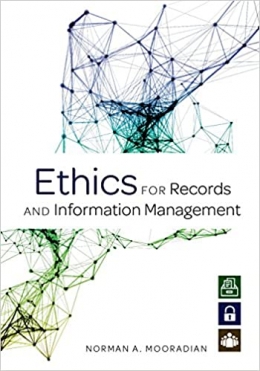Primary tabs
You don't need to be an ALA Member to purchase from the ALA Store, but you'll be asked to create an online account/profile during the checkout to proceed. This Web Account is for both Members and non-Members.
If you are Tax-Exempt, please verify that your account is currently set up as exempt before placing your order, as our new fulfillment center will need current documentation. Learn how to verify here.
- Description
- Table of Contents
- About the author
- Reviews
This book is available in e-book format for libraries and individuals through aggregators and other distributors—ask your current vendor or contact us for more information. Examination copies are available for instructors who are interested in adopting this title for course use.
The scope and reach of information, driven by the explosive growth of information technologies and content types, has expanded dramatically over the past 30 years. The consequences of these changes to records and information management (RIM) professionals are profound, necessitating not only specialized knowledge but added responsibilities. RIM professionals require a professional ethics to guide them in their daily practice and to form a basis for developing and implementing organizational policies, and Mooradian’s new book provides a rigorous outline of such an ethics. Taking an authoritative principles/rules based approach to the subject, this book comprehensively addresses
- the structure of ethics, outlining principles, moral rules, judgements, and exceptions;
- ethical reasoning, from meaning and logic to dilemmas and decision methods;
- the ethical core of RIM, discussing key topics such as organizational context, the positive value of accountability, conflicts of interest, and confidentiality;
- important ethical concerns like copyright and intellectual property, whistleblowing, information leaks, disclosure, and privacy; and
- the relationship between RIM ethics and information governance.
An essential handbook for information professionals who manage records, archives, data, and other content, this book is also an ideal teaching text for students of information ethics.
For a detailed Table of Contents, view this PDF
List of Figures
Introduction
1 The Structure of Ethics
2 Ethical Reasoning
3 Professional Ethics
4 Management Ethics
5 Whistle-Blowing and Information Leaks
6 Information Privacy
7 Concluding Thoughts: Information Governance and Ethics
Norman A. Mooradian
Norman A. Mooradian, PhD, has had a multifaceted career working as an information professional and as an academic focusing on digital ethics. He is Assistant Professor in the School of Information at San Jose State University, where he teaches courses in information ethics, AI & data ethics, and information retrieval. Prior to joining the faculty at SJSU, he was the Customer Education Manager at Konica Minolta in the Intelligent Information Management Division and worked in the IIM/ECM field for over 20 years in a variety of roles. Mooradian received his Ph.D. and M.A. in Philosophy from the Ohio State University. He also completed graduate courses in Legal Studies at the University of Illinois and attained the CIPP/US Information Privacy Professional Certification from the IAPP.
"Mooradian (senior solutions analyst, Konica Minolta) provides a solid framework of professional ethics that addresses a variety of records and information management issues, including confidentiality, conflicts of interest, intellectual property, privacy, and whistle-blowing ... Managers, records management staff, and personnel evaluation committees will find this book of value when creating policies and procedures and developing training programs for fair and responsible information management."
— Library Journal
"Here is a serious book for conscientious readers anxious to expand their understanding of ethics ... This book is aimed at readers who wish to understand ethics as a subject from the ground up—not merely what is considered ethical in particular situations. It is not scenario specific, but a carefully worded, carefully presented exposition of ethics, first as a broad subject, then, focusing on how the subject applies to professions in general, and, eventually, to discussions of how the foregoing applies to issues of particular interest to records and information managers as one type of professionals."
— Technicalities
"This book should serve admirably as a text for related coursework."
— The American Archivist



